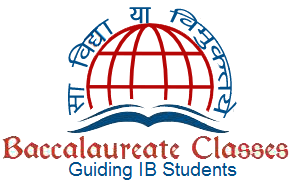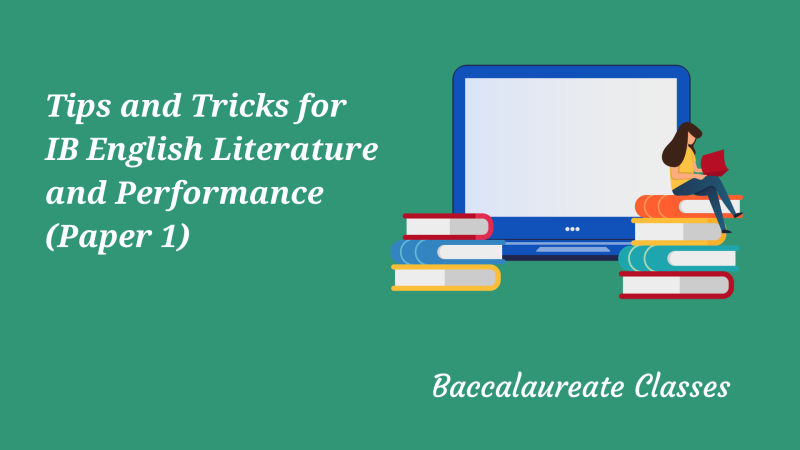OUR BLOG
Tips and Tricks for IB English Literature and Performance (Paper 1)
English Literature and Performance is a subject available in IB under both Group 1: studies in language and literature, and Group 6: the arts. It aims to explore the relation between literature and theatre. It involves close reading and critical analysis of major genres of literature including plays, poetry and prose and their practical, aesthetic and symbolic aspects in performance.
Here are the key features of this subject:
- It is available at standard level only.
- An in-depth understanding and analysis of how language, culture and context determine the meaning of literature and is developed through the exploration of texts from different cultures, periods and genres.
- Development of strong oral and written powers of expression, and a range of performance vocabulary and practical skills.
As a student of literature and performance, you are required to study a minimum of five texts. This blog focuses on the prose, the novel you would be studying and the required assessment.
PAPER 1 – PROSE AND PERFORMANCE
The novel you study is examined in paper 1 which is also an open book test. You are allowed to take a clean copy of your novel with you in the examination. However, it is not an easy exam. The paper you receive has three generic questions as each IB school teacher can choose which novel he/she wishes to teach. You have to choose one question that can be applied to your chosen novel and answer it in the form of an analytic essay. You are required to choose an extract from your novel that you think will help you answer the question, critically analyze its literary features and further explain how you would plan to dramatize it on stage. Your IB English tutor can explain this to you in detail if you are confused, however, here is a vague example:
For instance, you are studying The Wuthering Heights by Emily Bronte. It has recurring themes of romanticized love, death and some supernatural elements. The overall mood and setting is gloomy and dull. A question in paper 1 asks you to pick a passage from the novel where there is a key dialogue exchange between characters and dramatize it with particular reference to movement and speech. You must have realized how generic the question is and that it can be applied to any novel there is. Since, you have the novel in hand during the exam, you can skim read the passage that you think will help you answer this question. A possible passage from Wuthering Heights can be the dialogue exchange between Nelly and Catherine where Catherine describes her love for Linton and Heathcliff. It is an important turning point in the story with a rich collection of literary features and a lot of dramatic potential. Hence, you can analyze the passage and dramatize it in your essay.
Do not hesitate to consult your IB tutor to help you with understanding and analysis of the text. You have 1 hour 30 minutes to write your essay and it is marked out of 20 marks.
CLOSER LOOK AT THE ASSESSMENT CRITERIA
1) CRITERION A: Understanding of the novel and selection of the extract (5 marks)
This criterion examines whether or not you have understood the novel in the context in which it was written and the setting in which the plot unfolds. This understanding is reflected in your analysis and the choice of your passage. If you have prepared just one or two passages and not thoroughly analyzed the novel, your choice of passage is restricted and may not be apt for answering any of the questions in Paper 1 or the question you have chosen. Hence, read the entire text in detail, be careful when you are choosing the extract and be sure that it is relevant to the question you are answering. Your understanding of the novel is reflected in reference quotes. While writing your essay it is important to quote which word or words represent or portray a particular attribute or literary device. The more you quote and analyze, the better it is. However, the quotes must be relevant to the point you are trying to make and subsequent analysis. This tells the examiner that you are extremely well informed of the text you are analyzing. Discuss and analyze the novel with your online IB tutor to be able to write an informed analysis in your answer.
2) Criterion B: Ideas for dramatization based on interpretation of the literary text (10 marks)
The major bulk of your marks are given to this criterion. This criterion judges your imagination and dramatic vocabulary. You may have analyzed the passage beautifully but if you have not provided original insights into dramatization with reference to your analysis and the question then you will not score well. Your ideas should be practical and justified in relation to your textual literary analysis. You cannot have an actual dog or sheep on stage because the text has one in the scene. That would be impractical and poorly justified. Hence, judge if the animal in the scene is important. If so, think about alternatives to represent animals on stage.
The criterion demands you to answer the question – how would you transform a particular literary device in text to stage and what effect do you think that would have on the audience? Make sure that you have made connections in your dramatization to the literary devices in your essay. For example, imagery was a literary device used in the text and in the analysis you have said that this imagery creates a picture of a typical spring day and creates a happy and ecstatic mood. In your dramatization, talk about how you would portray this imagery on stage. Lots of flowers? Bright lights? Happy and ecstatic characters? Do you want the effect of this imagery to be the same for the audience or would you change something and why? This is not an easy task and your online IB English tutor can immensely help you look at the same scene in different ways and show you possibilities of transforming literary analysis to dramatic features.
3) CRITERION C: Use of language (5 marks)
Accurate, precise, concise and clear are the key words to remember. This criterion examines your ability to communicate complex and simple ideas effectively. Your writing should have variety in vocabulary and sentence structure. Correct grammar, spellings and sentence structure are important to score well in this criterion. You must use the right terminology that is subject specific and choose a formal and effective register. This can only be achieved with practicing and writing answers. Do not forget to get them checked and marked by your IB English tutor. Your IB tutors can not only give you detailed feedback but also give you insights and tips into making your writing more effective.
HOW TO PREPARE FOR PAPER 1: TIPS AND TRICKS
- Before you enter the examination hall, your preparation of your exam should include a list in your mind of at least 10-12 possible passages from different parts of the novel with different themes, characters etc. and a lot of dramatic potential. You can discuss this list with your online IB English tutor.
- To make sure these passages will help you answer at least one of the three questions, go through the last 10 years of past papers and check which question you would answer with which passage and how you would dramatize it. If you are confident that you can answer at least on question of each paper, then your list is perfect!
- Have a fair idea of dramatizing each of these passages. Look at the theatre convention, type of stage, lights and stage décor. Most importantly, imagine and explain the movement, speech, proximity, voice, pose, position of characters on stage etc. and other dramatic features in context of the literary analysis. Since questions are so generic, covering all dramatic features in your mind beforehand will help you easily form your essay to answer the question without wasting any time during exam! If you are stuck and wish to discuss ideas and possibilities, IB tuition by our expert tutors can always help you preparing for final exams!
- Be smart and take advantage of the book you have during exam. Lot of annotations are not allowed but you can surely underline certain words or subtly mark some important literary devices in all the extracts in the list you have made. If you prepare well, you will know exactly which literary device is portrayed by which word or sentence even if you have not annotated it with lots of words and definitions. Discuss and analyze your text for more literary devices and ideas for literary analysis with your online IB English tutor and revise regularly. Feel free to contact Baccalaureate Classes for any further information regarding IB tutoring.

